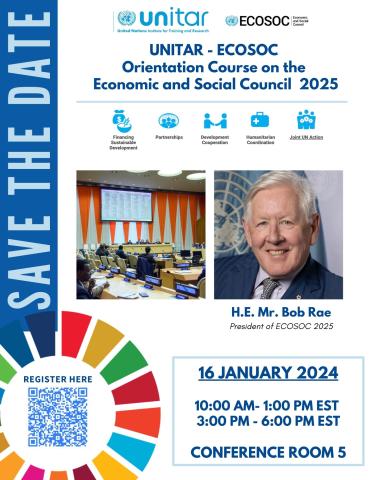
UNITAR Online Catalogue
UNITAR - ECOSOC: Orientation Course for new members of the Economic and Social Council (2025)

Accelerating SDG Implementation
Background
This event will only be held in person, and a valid UN badge is required for entering the building. No additional UN badge will be issued to participants for this event.
The morning portion of the event will last from 10:00 am - 1:00 pm, and the afternoon portion of the event will last from 3:00 pm - 6:00 pm. Please arrive at least 10 minutes ahead of time to secure your seats.
This course is designed explicitly for new members of the 2025-2026 ECOSOC.
The UN Charter established the Economic and Social Council (ECOSOC) in 1945 as one of the six main organs of the United Nations. The ECOSOC aims to advance the three dimensions of sustainable development – economic, social and environmental. It fosters debate and innovative thinking, forging consensus on ways forward, and coordinating efforts to achieve internationally agreed goals. Each year, ECOSOC structures its work around an annual theme of global importance to sustainable development. This ensures focused attention, among ECOSOC’s array of partners, and throughout the UN development system.
The Economic and Social Council provides a global platform for inclusive and integrated policy dialogue, follow-up and review, coordination and stakeholder engagement in support of the 2030 Agenda for Sustainable Development and related United Nations Agendas.
Duration: 1 Day, 16 January 2025
Venue: Conference Room 5, UN HQ
Time: 10:00 am - 1:00 pm EST, and 3:00 pm - 6:00 pm EST
Event Objectives
Key Objectives
- Familiarize themselves with the role and functions of the Economic and Social Council and its methods of work;
- Identify and assess the main issues before the Council;
- Gain a better understanding of the role of the President of the Council, its Bureau and its informal consultations in order to promote more effective participation;
- Analyze negotiation dynamics, based on case studies presented by international experts relating to the adoption of resolutions.